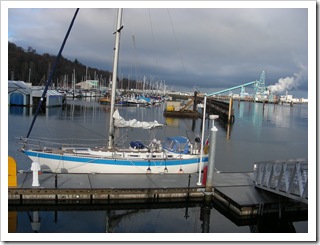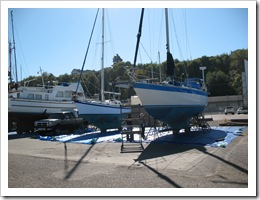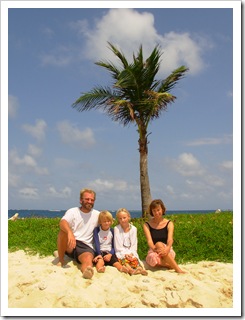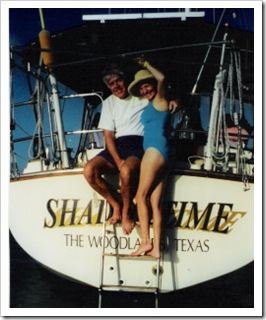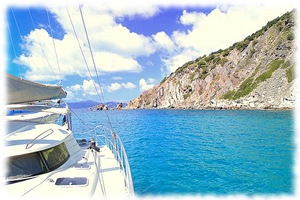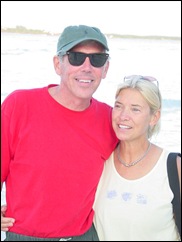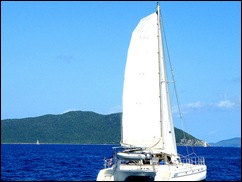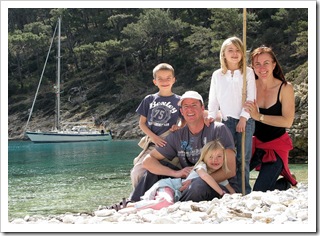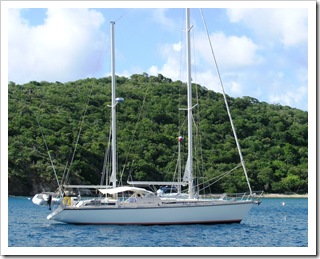 Bill & Judy Rouse named Bebe, their 2003 Amel Super Maramu (16m) hailing from St Thomas, because it was their granddaughter’s nickname. They left Texas, USA on May 1, 2006 and are still cruising. Over the years they have traveled the Caribbean (2 circles) from USVI to Trinidad, across Venezuela to Bonaire & Curacao, Cartagena & Panama; Galapagos Islands, French Polynesia, Niue and Kingdom of Tonga from Vava’U through Hai’pai to Tongatapu; south to New Zealand; north to Vanuatu & New Caledonia, Australia; Indonesia; Singapore; Malaysia (37 countries total including SE Asia land travel). You can learn more about them on their blog.
Bill & Judy Rouse named Bebe, their 2003 Amel Super Maramu (16m) hailing from St Thomas, because it was their granddaughter’s nickname. They left Texas, USA on May 1, 2006 and are still cruising. Over the years they have traveled the Caribbean (2 circles) from USVI to Trinidad, across Venezuela to Bonaire & Curacao, Cartagena & Panama; Galapagos Islands, French Polynesia, Niue and Kingdom of Tonga from Vava’U through Hai’pai to Tongatapu; south to New Zealand; north to Vanuatu & New Caledonia, Australia; Indonesia; Singapore; Malaysia (37 countries total including SE Asia land travel). You can learn more about them on their blog.Is there something you wish you had bought or installed before starting cruising?
No. Our boat was fully equipped for round-the-world cruising when she left the factory. This is the standard quality of Amel. The only thing we added was an AIS receiver in January 2008, which was new technology since our boat was built in January 2003. The AIS receiver is not a necessity, but it certainly is nice to know exactly where that big ship on the horizon is going to be in 10 minutes so you can adjust your course accordingly.
How would you recommend that someone prepares to cruise?
The standard recommendations are still the best advice.
1) Get your captains license or sailing school training or some kind of certification. Some places, like New Jersey and Greece, now require proof of competency or special licensing in order to operate a vessel in their waters. Having your captain’s license also usually provides a discount on insurance.
2) Attend training class for the specific engine in your boat. Even people thoroughly acquainted with diesel engines can benefit from a class geared specifically for their model engine.
3) Obtain offshore medical training, even if just a weekend class. The emphasis in this type training is quite different than standard EMT training. The offshore class teaches you what to do in case of an emergency when no help will be arriving anytime soon. The standard EMT training assumes you will arrive in a hospital emergency room within 20 minutes. The scenarios are entirely different.
4) Get going ASAP. Once you have the first 3 items mentioned and are sure your boat is seaworthy, start cruising. Don’t spend time trying to make your boat perfect; just go. Then don’t make any changes on your boat until you have been cruising for at least a full year. It takes that long to know what is important to you.
Have you found "trade goods" to be useful on your cruise? If so, what kinds?
Only once. Before heading out across the South Pacific we purchased numerous items with intentions of trading in the remote islands. We carried ladies sandals, lipsticks, nail polish, sewing items, fish hooks, men’s shirts and similar items. The opportunity to attempt trading never happened. In the Hai’pai Group of the Kingdom of Tonga we gave the men’s shirts to a man whose home had burned and he had lost everything. We ended up giving the rest of these items to people in Indonesia who approached our boat requesting “gifts.” No one wanted to trade; they just wanted gifts.
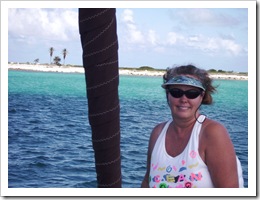 The only opportunity we encountered for trading in the South Pacific was at a small atoll in the Tuamotus of French Polynesia. A small boat containing 3 men approached our boat at anchor. They spoke only French and we spoke only English, but they managed to convey that they wished to trade black pearls for rum. (After all. the French word rhum sounds just like the English word rum.) We did not have rum to trade, but we did have cases of beer. We ended up trading 3 cases of beer for 21 black pearls. We had purchased the beer in Panama for only $10.50 per case, so this was a good deal for us; and the men were delighted to receive the beer. All forms of alcohol are extremely expensive in French Polynesia. At the local price equivalent of $60 USD per 6-pack for beer, in their opinions they had received $480 USD for the 21 black pearls. Yet our cost was only $31.50.
The only opportunity we encountered for trading in the South Pacific was at a small atoll in the Tuamotus of French Polynesia. A small boat containing 3 men approached our boat at anchor. They spoke only French and we spoke only English, but they managed to convey that they wished to trade black pearls for rum. (After all. the French word rhum sounds just like the English word rum.) We did not have rum to trade, but we did have cases of beer. We ended up trading 3 cases of beer for 21 black pearls. We had purchased the beer in Panama for only $10.50 per case, so this was a good deal for us; and the men were delighted to receive the beer. All forms of alcohol are extremely expensive in French Polynesia. At the local price equivalent of $60 USD per 6-pack for beer, in their opinions they had received $480 USD for the 21 black pearls. Yet our cost was only $31.50.What do you think is a common cruising myth?
A common cruising myth is that this lifestyle is inexpensive. There continues to be a myth that people can cruise for as little as $500 per month. This is totally unrealistic unless you are eating nothing except beans and rice and letting your boat fall into ruin by failure to do routine maintenance. Our costs have been much, much higher. A complete breakdown of our cruising costs for the first 4 years can be found on our blog.
Another common myth is that you can “self insure” the boat rather than carry proper insurance. That might have been true in the old days, but that is very unwise today because all countries are more environmentally conscious. If your boat is involved in any type accident, you will be responsible for any environmental damage. That cost could quickly exceed the cost of insuring a boat for years. One boat we know was lost when they hit a reef at a small Pacific island. Not only had they lost everything, they were not allowed to leave that island until they paid $10,000 for damage to the reef, plus the cost of removing the boat.
What is the key to making the cruising life enjoyable?
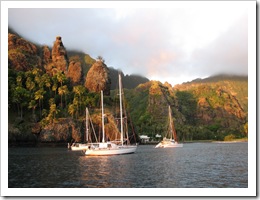 Having a boat that is designed and equipped for round-the-world cruising. We are spoiled with a watermaker that produces 180 liters per hour, a washing machine and 2 large lockers than can be set as either freezers or refrigerators. These items make all the difference in creature comforts when cruising. We cannot imagine cruising without these conveniences. Also equally important is enjoying the full-time company of your partner and learning to kick back and enjoy quiet times alone.
Having a boat that is designed and equipped for round-the-world cruising. We are spoiled with a watermaker that produces 180 liters per hour, a washing machine and 2 large lockers than can be set as either freezers or refrigerators. These items make all the difference in creature comforts when cruising. We cannot imagine cruising without these conveniences. Also equally important is enjoying the full-time company of your partner and learning to kick back and enjoy quiet times alone.What piece of gear seems to break the most often?
Nothing. Hope this statement doesn’t jinx us, but none of the normally problem-prone equipment such as generator or watermaker has caused us any problems. We almost feel guilty as our cruising friends work on their boats and we continue to have almost no problems. Amel makes a quality boat that comes direct from the factory fully equipped for crossing oceans in comfort. We have had only 3 pieces of equipment fail during our 4 ½ years of cruising. Our Furuno GPS antennae failed once; we had numerous GPS back-ups so it wasn’t that big of a problem. Our NMEA multiplexor failed once when crossing the Gulf of Carpentaria; replacement also solved that problem. The linear drive on our autopilot failed during one long passage; but Amel had installed 2 drives with an A/B switch, so we simply switched it to the chain drive and continued on. We almost felt guilty when this problem was so easily solved for us. Three other boats we know also had their autopilots fail during this passage north from New Zealand, and they had to hand-steer for days. We solved the problem by simply flipping a switch.
What do you enjoy about cruising that you didn't expect to enjoy?
Meeting people who have become lifelong friends. Having the time to read as much as we like. And occasionally playing games with other cruisers. Neither of us is a game person. But we have learned to enjoy playing Mexican Train Dominos and Rummy Cube; not because of the games themselves, but because of the camaraderie spending a few hours with friends.
Which spares do you wish you had more of? Less of?
We are fine in terms of spares. We had asked someone who was 2/3rds through his circumnavigation in a sister ship for his list of spares. He gave me his complete list reflecting deletions and additions. We followed that list and have been happy with the results.
What was the most affordable area you have cruised and the most expensive? What was affordable or expensive about each area?
 The most affordable areas were the San Blas Islands (Kuna Yala) of Panama and the Kingdom of Tonga. The San Blas were inexpensive because there was nothing to spend money on except moderate anchoring fees and molas for souvenirs or gifts. Just beautiful anchorages to enjoy. In Tonga there was very little to purchase so we spent very little. The most expensive place we have cruised was French Polynesia. Literally everything was expensive. The only things we found affordable in all of French Polynesia were the baguettes, which are price controlled. We grew so tired of the high prices of everything in French Polynesia that we left Bora Bora 2 weeks before our 90-day visas expired. Many cruisers want extended visas or multiple visits to French Polynesia. This beautiful expensive place was not a highlight for us. The second most expensive place was Australia. If we had it to do over again, we would skip Australia altogether.
The most affordable areas were the San Blas Islands (Kuna Yala) of Panama and the Kingdom of Tonga. The San Blas were inexpensive because there was nothing to spend money on except moderate anchoring fees and molas for souvenirs or gifts. Just beautiful anchorages to enjoy. In Tonga there was very little to purchase so we spent very little. The most expensive place we have cruised was French Polynesia. Literally everything was expensive. The only things we found affordable in all of French Polynesia were the baguettes, which are price controlled. We grew so tired of the high prices of everything in French Polynesia that we left Bora Bora 2 weeks before our 90-day visas expired. Many cruisers want extended visas or multiple visits to French Polynesia. This beautiful expensive place was not a highlight for us. The second most expensive place was Australia. If we had it to do over again, we would skip Australia altogether.What question do you wish I would have asked you besides the ones I've asked you and how would you answer it?
When you first set out cruising, did you have a cruising plan? If so, has it changed?
We had no specific cruising plan when we started. Bill would have been quite happy to spend years in the Caribbean, but by the second year in the Caribbean Judy wanted to seek out new horizons. So we headed farther westward in spring 2008 and should complete our circumnavigation in 2012 or 2013. Then we plan to sail the Caribbean for several more years or until we no longer enjoy cruising – and that might take many more years!
